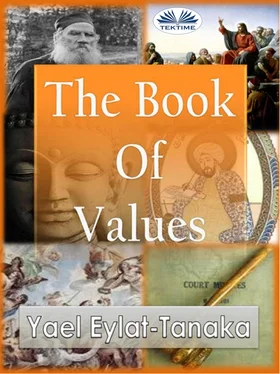Discretion
Eloquence
Empathy
Endurance
Enthusiasm
Ethics
Excellence
Faith
Faithfulness
Fidelity
Flexibility
Focus
Forbearance
Forgiveness
Fortitude
Freedom
Friendship
Frugality
Generosity
Gentleness
Grace
Graciousness
Gratitude
Grit
Happiness
Helpfulness
Honesty
Honor
Hope
Humility
Humor
Idealism
Impartiality
Innocence
Integrity
Joy
Justice
Kindness
Knowledge/Study
Love
Loyalty
Meekness
Mercy
Modesty
Moderation
Morality
Moxie/Mettle
Nobility
Openness
Optimism
Orderliness
Patience
Peace
Perfection
Perseverance/Persistence
Piety
Pleasure
Politeness
Pride
Prudence
Punctuality
Purity
Purposefulness
Reliability
Remorse
Reputation
Resilience
Resolve
Resourcefulness
Responsibility
Restraint
Righteousness
Self-Respect
Sensitivity
Serenity
Silence
Simplicity
Sincerity
Sobriety
Spontaneity
Steadfastness
Substance
Tact
Temperance
Tenacity
Thrift
Tolerance
Toughness
Tranquility
Tribute
Trustworthiness
Truth
Understanding
Valor
Veracity
Vitality
Virtue
Wisdom
Wonder
Work
Zeal
About The Author
WHY THIS BOOK
Society has become all too casual, from attire to speech. Behavior has followed suit, as have attitudes and sentiments. Within the pages of this book are time-honored principles that are as relevant today as they have always been, and do not impede freedom in society, but rather encourage harmony and a healthy expression of societal conventions. Morality is as applicable to today’s lifestyle as it was in the past.
Our moral values have not been lost. They are sometimes displayed in magnificent glory, as in the memorial museum of 9/11; at other times, they seem to lie dormant. Yet, they are present in all of us, and like the seedling that bursts through the fresh snow, they ultimately lift up their hearts and shine toward the light.
I have written this book without wishing to preach, without invoking religion, and without championing a particular philosophy. It is clear, however, that certain behaviors cause more problems than they solve, and therefore, it might behoove us to examine our thinking and belief systems so as to engender as much pleasure and happiness as possible for ourselves and those we interact with. This book should not be taken as a taskmaster, but should serve as a beacon, a guidepost to thought, and behavior.
You may find that some quotes and the text that follows, overlap; indeed, some of the values described share in significance and connotation.
The quotes herein are taken from historical luminaries, as well as from contemporary celebrities. I have attempted as best I can to assign proper attribution to each.
Yaël Eylat-Tanaka, 2014
🙛🙙
“Aspire to decency. Practice civility toward one another. Admire and emulate ethical behavior wherever you find it. Apply a rigid standard of morality to your lives; and if, periodically, you fail as you surely will adjust your lives, not the standards.”
~ Ted Koppel
From the beginning of time, moral codes have governed society. Morals were a set of rules for behavior that made it possible for living things to coexist. Those living things comprise not only human beings, but also certain members of the animal kingdom – lions, hyenas, wolves, and several other species. Rules had to be developed in order to establish an acceptable pecking order and ascribe a role for the alpha male’s status versus the young male vis-à-vis mating or feeding rights within that society, all for the purpose of smooth coexistence and harmonious interaction of the group members. While the pecking order among animals has remained fairly constant and predictable in establishing acceptable behavior, such is not the case among humans has not.
As civilization evolved, many of the rules that had been so useful in promoting and sustaining successful societies have been examined, tested, and reconfigured in favor of the current much more relaxed, devil-may-care attitude that reflects upon all facets of contemporary society, from lack of scruples in business to Wall Street greed and mendacity; from politics to the marital bed. Such overhaul in attitudes has also resulted in the epidemic of anxiety and depression that are rampant throughout the modern world.
This is not a summons to don the mantle of the cloth, or an endorsement to espouse a particular faith. It is about the timeless relevance of some rules of behavior that encompass much more than mere superficial courtesies; rules of behavior that are universal, that reach across our entire lives, both within our psyche and among our brethren.
Humans are flawed. We are endowed with all the qualities and potentials that can make us heroes or villains. It is a matter of choice, then, to decide the path our life will take, our role in the world, and the legacy we leave behind.
Wise men and women have spoken these thoughts before. From the eloquent lips of Winston Churchill to the ministerial heartfelt hopes of Mandela, from Michael Jackson and Oprah Winfrey to George Washington and Voltaire. Peace, faith, and charity are not simply lofty words heard from the pulpit; they are not old-fashioned and irrelevant – on the contrary: they are as relevant and significant today as they ever were.
Find your soul amid these words.
🙛🙙
"For after all, the best thing one can do when it is raining is let it rain." ~Henry Wadsworth-Longfellow
Our lives are marred by change. Change is the only constant. Yet, how often do we endeavor to change our environment, change the people in it, or their reactions and consequent behaviors? Change oftentimes is beyond our control. From inclement weather at inappropriate times to the behavior of others, we cannot change what has been, nor largely manipulate what will be. Our childhood memories are emblazoned in our minds, sometimes intact, oftentimes distorted by emotions and interpretations; and what happened a second ago, such as a bit of bad news, is just as much part of our past. Yet we spin our wheels, tormenting ourselves with thoughts of what could have been, what we might have done differently, what we might have said, or indeed, what others could have or should have said or done, with nary a thought to the impossibility of changing what is.
If a friend said something hurtful, it is pointless to think of what she should have said; it is senseless to lie awake at night thinking of what we could have replied in retort. It is done. It is in the past. There is only acceptance of what is. It may have been hurtful, and our pained feelings must be acknowledged and accepted. Indeed, it is only from the point of acceptance that any change can occur.
Читать дальше












